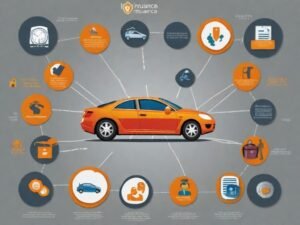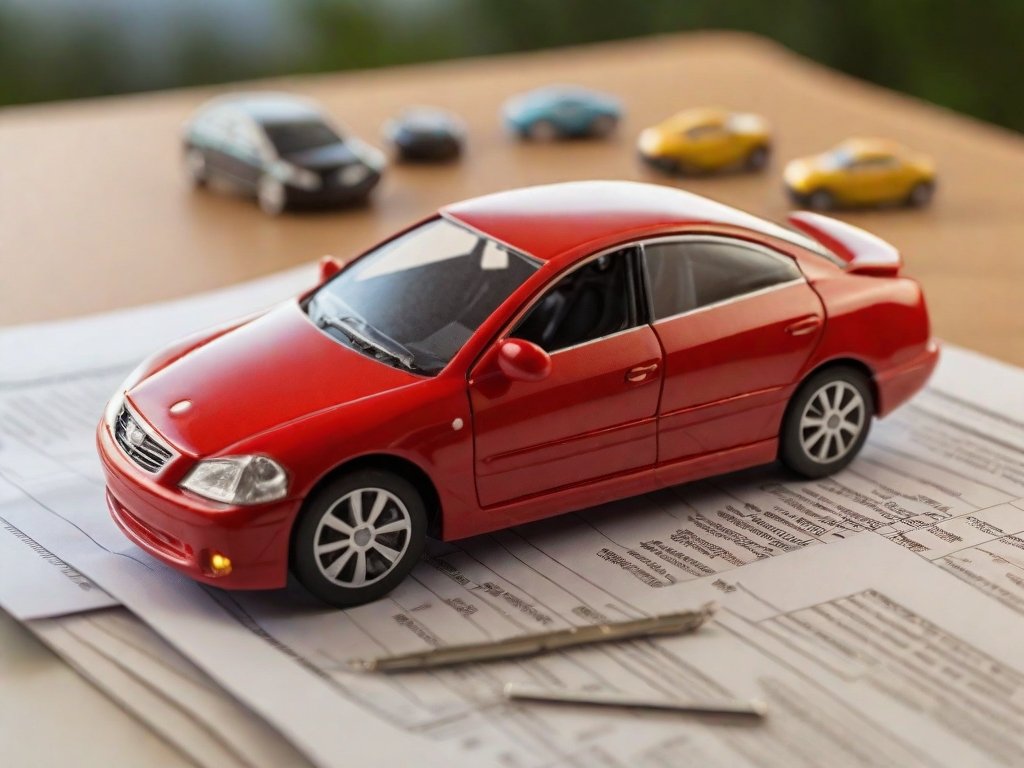The Benefits of Paying Off Your Car Loan on Your Car Insurance

Once you pay off your car loan, you may notice several benefits when it comes to your car insurance. One of the biggest advantages is that your insurance rate might decrease. When your car is paid off, the risk for the insurer is reduced, resulting in lower premiums for you. Without the burden of the loan, your car is considered less of a financial liability, making your car insurance cheaper in the long run.
Another advantage of paying off your car loan is that you have the flexibility to adjust your car insurance coverage. When you are still making payments on your car, lenders usually require you to carry comprehensive and collision coverage to protect your investment. However, once your car is paid off, you can decide whether you want to continue with these coverages or if you prefer to save money by reducing your coverage. This freedom to adjust your coverage based on your needs can make your car insurance more affordable over time.
Understanding the Relationship Between Car Insurance and Loan Repayment
As you near the end of your car loan, you may start to wonder about the relationship between car insurance and loan repayment. It’s natural to question how paying off your car loan can impact your insurance rates. The truth is, there is a connection between the two, and understanding it can help you make informed decisions about your coverage.
One of the primary reasons paying off your car loan can affect your insurance rates is due to the type of coverage you may no longer need. When you have an outstanding car loan, your lender typically requires you to maintain comprehensive and collision coverage. These coverages protect both you and the lender in case of an accident or damage to the vehicle. However, once your car loan is paid off, you may no longer need comprehensive and collision coverage, which can make your overall insurance cheaper.
How Paying Off Your Car Loan Can Lower Your Insurance Premiums
Paying off your car loan can have a significant impact on your car insurance premiums. Once you no longer have a loan, you may find that your insurance costs become cheaper. This is because insurance rates are often higher for vehicles that have outstanding loans. When you pay off your car loan, your car’s value becomes fully yours, and the lienholder is removed from the equation. As a result, the risk associated with insuring a vehicle with a loan decreases, making your car insurance go down.
Another way that paying off your car loan can lower your insurance premiums is by giving you more control over your insurance coverage. When you have a car loan, the lender typically requires you to carry certain types of coverage, such as comprehensive and collision coverage, to protect their interests. However, once your car is fully paid off, you have more flexibility to adjust your insurance coverage according to your needs. You can work with your insurance agent to review your coverage and determine if there are areas where you can reduce or optimize your coverage. This can result in a lower overall cost for your car insurance coverage, making it even more affordable now that you own the vehicle outright.
In the next section: Exploring the Impact of Loan Repayment on Car Insurance Rates, we will delve further into the specifics of how paying off your car loan influences your car insurance rates.
Exploring the Impact of Loan Repayment on Car Insurance Rates
When you pay off your car loan, it can have a significant impact on your car insurance rates. One of the most noticeable changes is that you may be able to let your insurance coverage levels go down. With a paid-off car, you may no longer need comprehensive coverage if you don’t mind covering the cost of repairs or replacement yourself. This can help lower your insurance premium and make your overall car insurance cheaper.
Additionally, paying off your car loan can also affect your collision coverage. With a car that is fully paid off, you may choose to increase the deductible on your collision coverage. By opting for a higher deductible, you can lower your car insurance premium. However, it is important to weigh the potential savings against the amount you would have to pay out of pocket in the event of an accident. It’s always a good idea to carefully review your insurance coverage options and consult with your insurer to ensure you have an appropriate level of protection for your needs.
The Role of Comprehensive and Collision Coverage in Car Insurance
Comprehensive coverage and collision coverage are two important types of coverage options that are commonly included in car insurance policies. These types of coverage provide protection for your own vehicle in the event of various situations, such as accidents, theft, vandalism, and natural disasters.
Comprehensive coverage typically covers damages that are not the result of a collision, such as theft, fire, and weather-related damages. On the other hand, collision coverage is designed to cover damages that occur as a result of a collision with another vehicle or object. When both comprehensive and collision coverage are combined, they are commonly referred to as “full coverage.”
Having comprehensive collision coverage in your car insurance policy is not always mandatory, but it may be required if you have a lienholder or are still making payments on your car. Additionally, even if you have paid off your car, having these types of coverage can still provide valuable protection for your vehicle. However, it’s important to note that the cost of comprehensive and collision coverage can vary depending on factors such as your deductible, the total value of your car, and your insurance company.
Gap Insurance: An Extra Layer of Protection for Paid-Off Cars
Gap insurance is an additional coverage option that can provide extra protection for paid-off cars. When you pay off your car loan, you may feel a sense of relief knowing that you no longer have to worry about making monthly payments or accruing interest in the car. However, it’s important to consider other factors, such as comprehensive and collision coverage. In the event that your car is totaled and you still owe money on your loan, your insurance company may only cover the actual cash value of the car. This can leave you with a financial gap between what your car is worth and what you still owe on the loan. Gap insurance can help bridge this gap, providing you with the necessary funds to pay off the loan if such an unfortunate situation were to occur.
When it comes to purchasing gap insurance for your paid-off car, it’s essential to consult with your insurance agent or provider. They can guide you through the process and help you understand the specific terms and conditions of the coverage. Your insurance company may require certain documentation, such as proof that your loan is paid off or information about your driving record. It’s important to let your insurance provider know about any changes in your car ownership status so they can accurately assess your insurance requirements. By having gap insurance in place, you can have peace of mind knowing that you will have the financial means to replace your car without the burden of a lingering loan. Additionally, having comprehensive and collision coverage in conjunction with gap insurance can lower your premium and provide an extra layer of protection for your paid-off vehicle.
What Happens to Your Car Insurance When Your Car is Paid Off?

When your car loan is finally paid off, you may be wondering what happens to your car insurance. The good news is that paying off your loan could lower your insurance costs. One of the factors that determine your insurance premium is the value of your vehicle. When you have a car loan, your comprehensive and collision coverage have to account for the potential loss that the lender would experience if your car is damaged or totaled. Once you pay off your loan, however, you may choose to lower your coverage to just liability insurance since you are no longer required to maintain comprehensive insurance by the lender. This reduction in coverage could lower your premium and save you some money on your car insurance.
It’s important to note that while lowering your coverage could lower your premium, you should still consider the coverage you need. If you have a newer or more valuable vehicle, it may still be beneficial to maintain comprehensive insurance to protect against potential damage or loss. Additionally, paying off your car loan may also open up opportunities for bundling your car insurance with your home insurance, which could result in even more savings. Ultimately, what happens to your car insurance when your car is paid off will depend on your individual circumstances and the choices you make regarding your coverage.
• Paying off your car loan could lower your insurance costs
• The value of your vehicle is a factor that determines your insurance premium
• Comprehensive and collision coverage account for potential loss to the lender if your car is damaged or totaled
• Once you pay off your loan, you may choose to lower your coverage to just liability insurance
• Lowering coverage could lower your premium and save you money on car insurance
• Consider the coverage you need based on the age and value of your vehicle
• Maintaining comprehensive insurance may still be beneficial for newer or more valuable vehicles
• Paying off your car loan may open up opportunities for bundling car and home insurance
• Individual circumstances and choices will determine what happens to your car insurance when it’s paid off
The Importance of Regularly Reviewing Your Car Insurance Coverage
Regularly reviewing your car insurance coverage is essential, even after you have paid off your loan and own your car outright. Why, you may wonder? Well, life is unpredictable, and circumstances can change in an instant. If you were to get into an accident or encounter a situation where you need to file a claim, it’s crucial to ensure that your policy adequately covers your needs.
For instance, if your car doesn’t have comprehensive and collision coverage, you may find yourself in a bind if you need to repair or replace your car due to an accident or other unexpected events. By regularly reviewing your car insurance coverage, you can assess whether you need additional or extra coverage like gap insurance. This extra layer of protection can come in handy if your car is paid off, as it can help bridge the gap between what you owe on your car and its current value in case of a total loss. Remember to reach out to your insurance provider to discuss the options available to you and potentially save on your auto insurance by reducing your insurance premiums. Many car insurance companies offer discounts if you bundle your policies or if you have a good driving record, so taking the time to review your coverage can help you save money on car insurance in the long run.
How Homeowners Insurance Can Affect Your Car Insurance Rates
Homeowner insurance can have an impact on your car insurance rates, especially when it comes to selecting the right type and amount of coverage. When paying off a loan on your car, you may be required to carry comprehensive or collision coverage, but once the loan is paid off, you have more control over the type and amount of coverage you get.
Owning your car outright means you have the flexibility to adjust your coverage to better fit your needs. For example, you may choose to reduce your coverage or lower your coverage limits to save on insurance premiums. However, it is important to consider the potential risks involved. While lowering your coverage may result in a lower premium, it also means you may have less financial protection in the event of an accident or a mechanical breakdown not covered by your policy. So, it’s essential to strike a balance between saving money and ensuring you have adequate coverage.
Tips for Saving Money on Car Insurance after Paying Off Your Loan
If you’ve recently paid off your car loan, congratulations! It’s a great accomplishment, and it can also bring some financial relief. With the burden of monthly repayments lifted, you may find yourself with some extra money in your pocket. But just because you no longer have a car loan doesn’t mean you can let your insurance fall by the wayside. In fact, it’s still essential to have car insurance to protect your vehicle and your finances. However, now that you’re no longer making loan payments, you may be able to explore different ways to save money on your car insurance.
One tip for saving money on car insurance after paying off your loan is to consider bundling policies. Many insurance companies offer discounts if you have multiple policies with them, such as car insurance and renters insurance. Bundling your policies can help pay less overall for your insurance coverage. Additionally, now that you don’t have a car loan, you may be able to afford to pay a higher deductible. A higher deductible means you’ll have to pay more out of pocket if you have a claim, but it can also result in lower monthly premiums. It’s important to review the coverage you currently have and assess whether you need to carry additional coverage. For example, if your car is older and the value has depreciated significantly, you may not need comprehensive coverage, which can save you money.










Leave a Reply